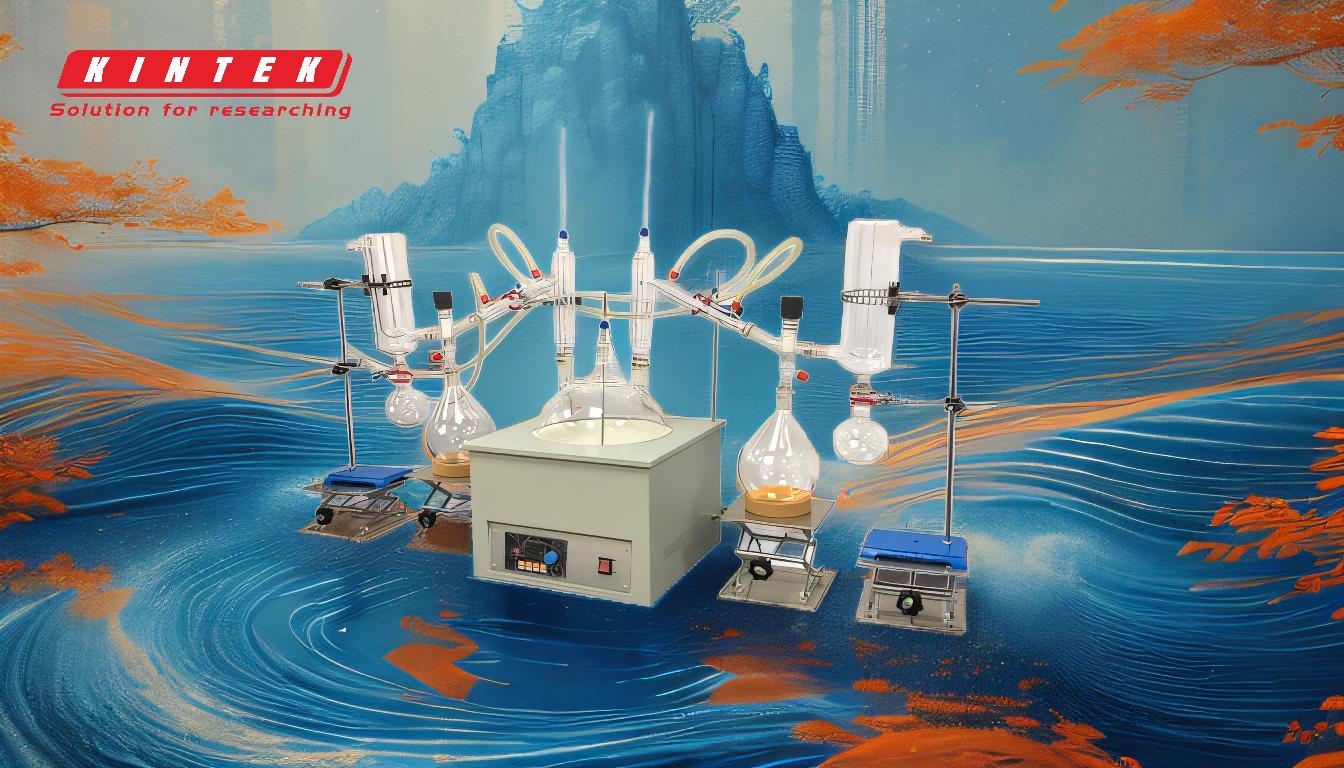Molecular distillation of CBD is a specialized purification process that operates under high vacuum conditions to separate and refine cannabinoids, such as CBD, from crude extracts. This method is particularly effective for thermally sensitive compounds like CBD, as it avoids high temperatures that could degrade the material. By leveraging differences in molecular mean free paths and evaporation rates, molecular distillation ensures high-purity CBD by removing impurities such as residual solvents, chlorophyll, and other unwanted compounds. The process involves a short-path setup where the evaporation and condensation surfaces are closely positioned, enabling efficient separation without boiling. This technique is widely used in the cannabis industry to produce high-quality CBD oils and concentrates.
Key Points Explained:

-
Definition and Principle of Molecular Distillation:
- Molecular distillation is a vacuum distillation process operating at extremely low pressures (≈ 0.01 torr or 1.3 Pa).
- It relies on the principle of molecular mean free path, where lighter molecules travel farther and condense on a nearby surface, while heavier molecules return to the liquid.
- The process occurs below the boiling point of the materials, making it ideal for thermally sensitive compounds like CBD.
-
Application to CBD Purification:
- Molecular distillation is used to refine CBD extracts by removing impurities such as residual solvents, waxes, chlorophyll, and other plant compounds.
- The process ensures high-purity CBD by separating it from other cannabinoids and unwanted substances.
- It is particularly effective for producing CBD isolates and distillates with consistent quality.
-
Equipment and Process Design:
- Molecular distillation systems feature a short-path design, where the evaporation and condensation surfaces are placed close together to minimize molecular travel distance.
- Common designs include rotating film systems, which create a thin film of the material on the evaporation surface for efficient heating and separation.
- The process operates under high vacuum to reduce the boiling points of the components, enabling separation at lower temperatures.
-
Advantages of Molecular Distillation for CBD:
- High Purity: The process removes virtually all impurities, resulting in a highly refined CBD product.
- Thermal Sensitivity: By operating at low temperatures, molecular distillation preserves the integrity of CBD and other cannabinoids.
- Scalability: The process can be scaled for industrial production, making it suitable for large-scale CBD manufacturing.
- Versatility: It can be used to process a wide range of cannabinoids and terpenes, allowing for tailored formulations.
-
Industrial Use and Examples:
- Molecular distillation is widely used in the cannabis industry for producing CBD oils, isolates, and concentrates.
- It is also applied in other industries for purifying oils, such as deodorizing and decolorizing edible oils or removing cholesterol from animal fats.
- For example, under 10^-4 torr pressure and 2500°C, cholesterol can be removed by 90% from lard and butter within two hours, demonstrating the efficiency of the process.
-
Comparison to Other Distillation Methods:
- Unlike traditional distillation, molecular distillation does not rely on boiling the mixture, which reduces the risk of thermal degradation.
- It is more efficient than fractional distillation for separating compounds with similar boiling points, as it leverages differences in molecular mean free paths.
- The short-path design ensures minimal energy consumption and faster processing times compared to other vacuum distillation methods.
-
Importance for CBD Consumers and Manufacturers:
- For consumers, molecular distillation ensures a safe and high-quality CBD product free from harmful contaminants.
- For manufacturers, it provides a reliable method for producing consistent and marketable CBD products.
- The process also allows for the customization of cannabinoid profiles, enabling the creation of specific formulations for different applications.
By understanding the principles and applications of molecular distillation, CBD manufacturers can leverage this advanced technology to produce premium-quality products that meet the growing demand for purity and consistency in the cannabis industry.
Summary Table:
| Key Aspect | Details |
|---|---|
| Process Principle | Operates under high vacuum (≈ 0.01 torr) using molecular mean free path. |
| Application | Removes impurities like solvents, waxes, and chlorophyll from CBD extracts. |
| Equipment Design | Short-path setup with rotating film systems for efficient separation. |
| Advantages | High purity, thermal sensitivity, scalability, and versatility. |
| Industrial Use | Produces CBD oils, isolates, and concentrates; also used in edible oil refining. |
| Comparison to Other Methods | Avoids boiling, reduces thermal degradation, and is faster and more efficient. |
Discover how molecular distillation can elevate your CBD products—contact us today for expert guidance!










